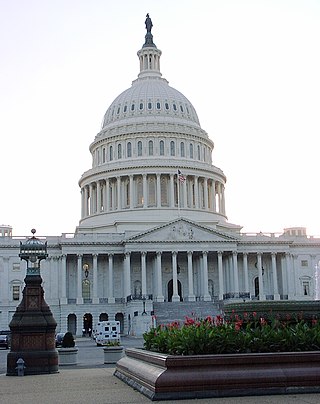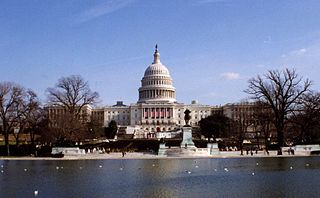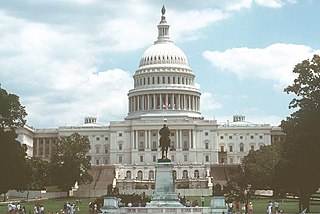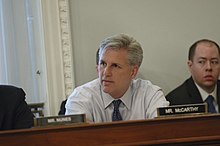
The 106th United States Congress was a meeting of the legislative branch of the United States federal government, composed of the United States Senate and the United States House of Representatives. It met in Washington, D.C., from January 3, 1999, to January 3, 2001, during the last two years of Bill Clinton's presidency. The apportionment of seats in the House of Representatives was based on the 1990 United States census. Both chambers maintained a Republican majority.

The 105th United States Congress was a meeting of the legislative branch of the United States federal government, composed of the United States Senate and the United States House of Representatives. It met in Washington, DC from January 3, 1997, to January 3, 1999, during the fifth and sixth years of Bill Clinton's presidency. Apportionment of seats in the House of Representatives was based on the 1990 United States census.

The 104th United States Congress was a meeting of the legislative branch of the United States federal government, composed of the United States Senate and the United States House of Representatives. It met in Washington, D.C. from January 3, 1995, to January 3, 1997, during the third and fourth years of Bill Clinton's presidency. Apportionment of seats in the House of Representatives was based on the 1990 United States census.

The 103rd United States Congress was a meeting of the legislative branch of the United States federal government, composed of the United States Senate and the United States House of Representatives. It met in Washington, D.C. from January 3, 1993, to January 3, 1995, during the final weeks of George H. W. Bush's presidency and in the first two years of Bill Clinton's presidency. The apportionment of seats in the House of Representatives was based on the 1990 United States census.

The 102nd United States Congress was a meeting of the legislative branch of the United States federal government, composed of the United States Senate and the United States House of Representatives. It met in Washington, D.C., from January 3, 1991, to January 3, 1993, during the last two years of George H. W. Bush's presidency. This is the most recent Congress where Republicans held a Senate seat from California.

The 100th United States Congress was a meeting of the legislative branch of the United States federal government, composed of the United States Senate and the United States House of Representatives. It met in Washington, D.C., from January 3, 1987, to January 3, 1989, during the last two years of Ronald Reagan's presidency. The apportionment of seats in the House of Representatives was based on the 1980 United States census.

The 99th United States Congress was a meeting of the legislative branch of the United States federal government, composed of the United States Senate and the United States House of Representatives. It met in Washington, D.C., from January 3, 1985, to January 3, 1987, during the fifth and sixth years of Ronald Reagan's presidency. The apportionment of seats in the House of Representatives was based on the 1980 United States census.

The United States Senate Committee on Energy and Natural Resources is a standing committee of the United States Senate. It has jurisdiction over matters related to energy and mineral resources, including nuclear development; irrigation and reclamation, territorial possessions of the United States, trust lands appertaining to America's indigenous peoples, and the conservation, use, and disposition of federal lands. Its roots go back to the Committee on Interior and Insulars Affairs. In 1977, it became the Committee on Energy and Natural Resources, and most matters regarding Native Americans, Alaska Natives, and Native Hawaiians were removed from its jurisdiction and transferred to the Committee on Indian Affairs.

The Senate Committee on Indian Affairs is a committee of the United States Senate charged with oversight in matters related to the American Indian, Native Hawaiian, and Alaska Native peoples. A Committee on Indian Affairs existed from 1820 to 1947, after which it was folded into the Committee on Interior and Insular Affairs. A new Native Affairs Committee was created in 1977, initially as a select committee, as a result of the detachment of indigenous affairs from the new Committee on Energy and National Resources, which had succeeded the old Committee on Interior and Insular Affairs. The committee was initially intended to be temporary, but was made permanent in 1984. The committee tends to include senators from Western and Plains states, who have more Native American constituents.

The 98th United States Congress was a meeting of the legislative branch of the United States federal government, composed of the United States Senate and the United States House of Representatives. It met in Washington, D.C., from January 3, 1983, to January 3, 1985, during the third and fourth years of Ronald Reagan's presidency. The apportionment of seats in the House of Representatives was based on the 1980 U.S. census.

The 97th United States Congress was a meeting of the legislative branch of the United States federal government, composed of the United States Senate and the United States House of Representatives. It met in Washington, D.C., from January 3, 1981, to January 3, 1983, during the final weeks of Jimmy Carter's presidency and the first two years of Ronald Reagan's presidency. The apportionment of seats in the House of Representatives was based on the 1970 United States census.

The 96th United States Congress was a meeting of the legislative branch of the United States federal government, composed of the United States Senate and the United States House of Representatives. It met in Washington, D.C. from January 3, 1979, to January 3, 1981, during the last two years of Jimmy Carter's presidency.

The U.S. House Committee on Armed Services, commonly known as the House Armed Services Committee or HASC, is a standing committee of the United States House of Representatives. It is responsible for funding and oversight of the Department of Defense (DoD) and the United States Armed Forces, as well as substantial portions of the Department of Energy. Its regular legislative product is the National Defense Authorization Act, which has been passed by Congress and signed into law each year since 1962.

The 93rd United States Congress was a meeting of the legislative branch of the United States federal government, composed of the United States Senate and the United States House of Representatives. It met in Washington, D.C., from January 3, 1973, to January 3, 1975, during the last 18 months of Richard Nixon's presidency, and the first 6 months of Gerald Ford's. This Congress was the first Congress with more than two Senate presidents. After the resignation of Spiro Agnew, Gerald Ford was appointed under the authority of the newly ratified 25th Amendment. Ford became president the next year and Nelson Rockefeller was appointed in his place. The apportionment of seats in the House of Representatives was based on the 1970 United States census. Both chambers had a Democratic majority.

The 92nd United States Congress was a meeting of the legislative branch of the United States federal government, composed of the United States Senate and the United States House of Representatives. It met in Washington, D.C., from January 3, 1971, to January 3, 1973, during the third and fourth years of Richard Nixon's presidency.

The Committee on Energy and Commerce is one of the oldest standing committees of the United States House of Representatives. Established in 1795, it has operated continuously—with various name changes and jurisdictional changes—for more than 200 years. The two other House standing committees with such continuous operation are the House Ways and Means Committee and the House Rules Committee. The committee has served as the principal guide for the House in matters relating to the promotion of commerce and to the public's health and marketplace interests, with the relatively recent addition of energy considerations among them. Due to its broad jurisdiction, it is considered one of the most powerful committees in the House.

The 78th United States Congress was a meeting of the legislative branch of the United States federal government, composed of the United States Senate and the United States House of Representatives. It met in Washington, D.C., from January 3, 1943, to January 3, 1945, during the last two years of Franklin D. Roosevelt's presidency. The apportionment of seats in the House of Representatives was based on the 1940 United States census.

The 75th United States Congress was a meeting of the legislative branch of the United States federal government, composed of the United States Senate and the United States House of Representatives. It met in Washington, D.C., from January 3, 1937, to January 3, 1939, during the fifth and sixth years of Franklin D. Roosevelt's presidency.
The United States Senate Energy and Natural Resources Subcommittee on Public Lands and Forests is one of four subcommittees of the U.S. Senate Energy and Natural Resources Committee.
The United States House Natural Resources Subcommittee on Fisheries, Wildlife, Oceans and Insular Affairs was one of the five subcommittees within the House Natural Resources Committee. Its purview has been split between two successor subcommittees: the Subcommittee on Indian, Insular and Alaska Native Affairs, and the Subcommittee on Water, Power and Oceans.











